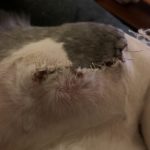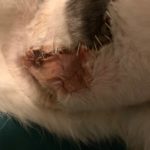Hi Jenn- I don’t know if this advice will help, but Dori is crazy like that too. While she has free roam of the house, we have things set up where she also has areas that are just hers, and that seems to have helped a little bit. She still “kills” furniture and pillows, but it isn’t as bad as it was.
Good Morning Pawbly friends-
I have a corn cob question… Thursday (a week ago) Rontu threw up a bunch of grass and a white blob. We could not figure out what the heck it was, or where he got it from. He was fine- running, playing, pooping. I always check their poo schedule and make sure it looks normal- sorry I’m weird. Anyway, Friday evening on our walk he pooped and I swear it had a chunk (pretty sizeable) of corn cob in it. We do not eat corn, so I have no idea when or how he got into corn. Especially this time of year when none of the fields around us are growing yet. Then again on Saturday morning on our long walk around 11, he passed another, much smaller chunk of cob. He had already done a normal poo at our early morning walk. He has been acting normal ever since. My original “plan” with all of this covid going on was to watch him closely and see if he passed it, which he seems to have. He is having normal bathroom and has been eating and drinking normally- so I thought we dodged that bullet. But every so often, he is slow to get up- and his back legs quiver. After he has a poo, it stops and he is running and playing and having a ball. It happened this morning and Monday morning. So my question is, does this warrant a trip to the vet? I hate to bother everyone during this hard time. And could it be related to the corn cob somehow? Sorry for the long post.
Comments
A year and a half ago we rescued a 4 week old kitten who presented unresponsive with a body temp so low it did not register. She was revived. As the caretaker was going to put her back out that evening I stepped in and offered to take her with the plan to rehome her. I have rehomed dozens of kittens over the years, all who came from feral colonies. From the get go Annabelle was incredibly sick and had behaviors that weren’t what we were used to. When held she would attack faces, when stimulated she would attack, we continued to work with her and a year and a half later she lays with us at night and as long as we don’t touch her does not attack people. Instead she attacks items. This occurs whenever there is any stimulation in our home, folding laundry, cleaning out a closet, dogs playing, children laughing, the list goes on and on. She has destroyed a sofa, armchair, curtains, tablecloths, comforters, sheets, duvet covers, etc, etc. We can not trim her nails….because we can’t handle her and truly even with her nails trimmed I am sure she would rip things apart with her teeth. We are no stranger to ferals, I am happy to allow them to hide until they feel comfortable, there is no hiding with Annabelle instead she literally runs into the chaos. When we let our dogs out and at feeding time out she runs into the chaos, when I vacuum she runs around the room, when we have company she runs around as I warn our guests not to touch her. We are no stranger to keeping cats happy, we have cat towers, scratching posts, scratching boards, elevated areas, areas to hide. Our other 4 cats are incredibly happy members of our family. I am at my whits end, I honestly feel like we attempted to tame a raccoon and are living with it in our house. I do wonder if Annabelle would be happier outside, but with no sense of danger and a habit of running into the chaos I can’t help but worry she would get killed….and I didn’t save her to have that happen.
I am open to suggestions and curious if anyone has ever had a similar experience.
Comments
Five days ago my 7year old German Shepherd was out side playing and running with my beagle puppy. Next thing I know she is yelping in pain and rolling around on the ground. By the time I get to her she has stopped crying out and is laying still. I realize both hind legs are paralyzed. We immediately take her to the vet and she is examined. She doesn’t appear to be in any pain and she DOES have deep pain sensation! She is immediately started on Steroids, Muscle Relaxers, and Anti Inflammatories. She remains at the vets for five days and receives cold laser therapy and a small amount of PT. She never looses her DPS and really seems to be in good spirits. I took her home yesterday and I am determined to help her regain her mobility. I do not have a true diagnosis and seeing a Neurologist is not going to happen due to finances and living so far from one. My vet told me to take her home and gave me range of motion exercises and told me to buy her a harness. He said it will just take time. She is able to relieve herself without help! She is reacting more each day to us touching her legs and back!!
I am so confused and have read everything I can find on the subject and can’t get any answers. Should I start working with her and letting her walk or should I confine her to her kennel for a while? Should I use a harness or not? I just wish I had some answers!! Please help!!
Comments
My vet strongly suspects my cat has a nasal polyp. She has be snoring/snarling consistently for 2.5 years, but is otherwise fine. When it began, I first had a potential infection treated with two antibiotics, followed by a teeth cleaning, that yielded no issues with the teeth, and ended with a nasal flush. My vet was hoping to be able to see and grab the polyp during the flush, but couldn’t. Because she was otherwise healthy, eating, and playing, I went without treating it. Recently, she was treated for a G.I. flair up that had her not eating. She had begun not eating or moving get bowels for days. Once vomiting was added in, I took her to Metropolitan Emergency Vet. They gave her an ultrasound, saw the inflammation and gas in her abdomen, took a CBC, gave her fluids and nausea medication and sent her home a couple hours later for $800. Her bloodwork was was fine, aside from dehydration. She continued not to eat, so I brought her to my vet a day and a half later. They did an x-ray and saw the lower intestine looked aggravated. They kept her for the weekend and gave her fluids and more nausea medication. She returned to me after two days and began eating again at home. I’m awaiting the additional $600 bill for that. While being discharged, one of the docs urged me to address what she felt strongly was likely a polyp in her nasal cavity, as she believed it may now be large enough that it’s limiting her ability to smell, which may have contributed to the refusal to eat with the G.I. issue coexisting for a few days. She referred me to the specialty docs locally to have the nasal polyp removed. They are quoting me $3,195 plus. They said it would be $195 for a internal med consult, $1,500 for a “necessary” CT, and $1,500 or more for the Rhinoscopy. My vet said Lilah is otherwise a healthy 12 year old cat. I am sick with the cost, as I will need to put it all on a credit card. I have called around to multiple other specialty vets and I’m getting comparable quotes. I have had family members suggest I euthanize my cat over a nasal polyp, which I absolutely will not do. I stumbled across a Utube video of you removing a nasal polyp, so I tracked you down by name, wondering if you could help Lilah? I’m two hours from your practice, which is close enough. I’d really appreciate you getting back to me. As of now, we have a consult scheduled for 3/4, and I’m sick over the cost.
Thank you,
Diana Maginn
Comments
My dog has a seroma above right eye. He is very clumsy and we think he simply hit his head on something, or while playing with another dog.
It has been drained three times, but continues to return. He otherwise is in perfect health and is not concerned with his lump in the slightest. How long do these things take to go away? We have already tried the “wait a month” and see approach.
Cheers and thanks.
Jon
Comments
Hello, I have a 2.5 year old desexed female cat and a 4-month-old male kitten. We moved house 4 months ago, and adopted the new kitten about 3 months ago. In our previous house, we used to let the older cat out during the day to roam the neighborhood, although she never went too far.
Since we’ve moved, we only let her out once or twice a week as there are a lot of cats here and she gets into more fights and has gotten injured once. She seems very stressed out, wanting to go out constantly.
We have tried everything to ease her stress: playing with her a lot, brushing and cuddling her daily, giving her a mix of wet and dry good food (that she likes), putting up Feliway diffuser around the house, and she plays with the kitten daily.
However, she still exhibits signs of stress, ie hiding, minor crouching, hissing or growling from time to time to us or the kitten, sleeps more, meows more, generally less affectionate towards us.
Do we have to let her go outside daily like before, so she can be less stressed, or is there any other way to lessen her stress? It has been 4 months and I am worried it will become chronic stress for her.
Comments
Hello! I just discovered this app via a YouTube video, as I now spend my days googling things like “Cat breathing loudly” and “normal cat breathing”…!
Since perhaps June I’ve noticed with increasing regularity my cat, Clover, breathing very loudly, sometimes to the point of waking me up with the sound. In September this progressed and my husband noticed her breathing freakishly fast and we rushed to a vet.
However 5 vets, including a specialist, many xrays, and treatment for gum disease later, no one seems to know what it is, and I can’t take the wait and see method they are prescribing. She is playing and eating and otherwise normal, but her breathing does seem to bother and annoy her and at times she looks very despondent.
The history is that almost two years ago I made the most terrible judgement call of my life and she got out the window of a new apartment and fell 4 floors. She was unable to use her back legs for a few days during which they kept her under observation and she needed stitches in her soft palate. She has made an almost complete recovery.
The accident happened exactly a week after our other cat contracted an unknown disease and died suddenly and shockingly at aged 5. I still haven’t recovered from our other cat’s passing and both my husband and I comfortably acknowledge that Clover is the number one love in my life, and I will do everything to keep her alive and happy. However we have reached our pet insurance limit and I am so concerned about what will be next.
I have done all of the internet researching there is to be done, and I just know looking at her and hearing her stressful breathing that something is very wrong. I don’t know if it’s connected to the fall, but it isn’t bronchitis or asthma both of which treatments did less than nothing.
If anyone has any advice or had a cat with similar symptoms please let me know what you think?!
Comments
I have the sweetest Siamese mix, Goldie, adopted from our local humane society. Unfortunately, she has been a sick kitty and she’s had 4 URIs in her two years of life. She did take the full course of antibiotics for all of them and healed successfully.
Recently, she’s been making low snoring noises periodically when awake and sleeping and it seems to be only when inhaling. She’s a talkative girl and sometimes her voice changes when meowing. She has no other symptoms and is eating, drinking and playing normally and there has been no mouth breathing while making the noises. Her breathing rate has been normal. Sometimes it seems like she is making the noises and then stretches out real long in the first picture to get comfortable.
Below is a link to her video around 24 seconds you can hear it, you might have to put it at full volume:
If this is difficult to hear it sounds very similar to this:
I have a vet appointment next week and am concerned she has stertor from an oropharyngeal polyp from my online research and her symptoms. Is this something that a vet would be able to see without putting them under sedation? Are there any other suggestions you have as to what I could have them test for if it’s not a polyp? I wasn’t sure if she could have asthma or another breathing related issue.
Finally, do you by chance have any recommendations for vets in Phoenix, Arizona? I am just getting myself prepared if needed for a second opinion or if surgery is necessary.
Appreciate it and all your tips and videos online! You are doing incredible work!
Comments
I recently adopted my cat, Critter, as he was on my grandma’s farm and had a paw infection. We brought him inside and started him on antibiotics. Unfortunately, the infection did not respond as hoped and he had to have his leg amputated.
After this, he was back to a perky young cat – playing and eating well. A week after surgery I noticed a bump just below the incision. I asked my vet if I should be concerned, and she said not unless it’s hot and that it’s probably a seroma. This made sense to me as he was more active than he probably should have been post surgery.
The next day, that bump burst and started leaking fluid. It was pink and not super cloudy, not smelly or hot. I kept and eye on it all day, and found that it never stopped leaking, so today I took him to the vet. There appears to be a small hole and it’s infected. It’s not at the site of the incision and the incision looks perfect.
He’s on a higher dose of antibiotics now, and some more pain meds as it is tender. He had the wound flushed this morning, and goes again in two days for another flushing.
I guess my question is – is it possible this is the same infection as before? The vets who performed the amputation said they were positive they got any infection (even taking the lymph node), I’m hoping that this is secondary and that maybe the bump was caught on something, or he scratched it open?
ETA: 1st photo is Saturday night, 2nd photo is Sunday afternoon, 3rd photo is today after flushing and rest.
Comments
Is it normal for a cat in heat to have abdominal swelling? My cat is 3 yrs old and we have been meaning to spay her, but she goes into heat so often it’s hard to find time to do it. She is currently in heat and has been for over a week, and last week she had shown asymmetrical swelling on the left and right of her belly. The next day it went down so I figured it was nothing serious and probably swelling from being in heat. Now it has been a week she is still in heat and her abdomen seems just ever so slightly fuller on the right and left and firm. She is crazy in heat and doesn’t show any signs of being sick, acting normal, eating drinking, playing and jumping.
Is it possible for a cat in extreme heat to cause extreme swelling of the ovaries to where they would be palpable? I’m worried it could be early signs of pyometra, or if this is normal with heat. Her cycles have gotten more intense and extreme, as well as longer and more often, which makes me think it could be possible her reproductive system is simply engorged with blood causing it to be palpable.
If that (the swelling) is not normal with heat then I’ll take her to the vet ASAP, but again she is not grossly distended, she just appears “full”. Also there is no chance of pregnancy. Thanks.













Hello!
i have to start at the most concerning part of your question: who doesnt eat corn? its not the checking the poo that makes you weird.. its the corn, 😉
I think that your plan,, even amongst the COVID stuff is perfect! Just watch closely. Corn cobs are most concerning with respect to obstruction. Obstruction causes anorexia, vomiting, lethargy. I am not sure if the leg issues are related. Based on breed and age I would recommend an x-ray of the hips when we are back up and running normally..
Watch for normal eating, normal activity and normal fecal output. call me anytime if you are worried,, as far as to where the corn cob came from.. who knows,, it might have been pieces left over from last season. thats where my dogs get theirs.
Thank you!!????????